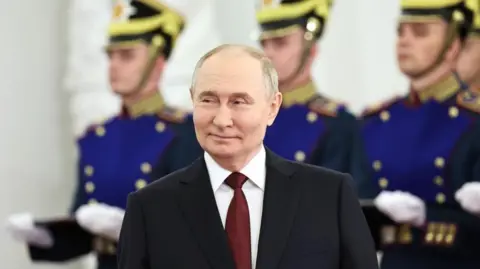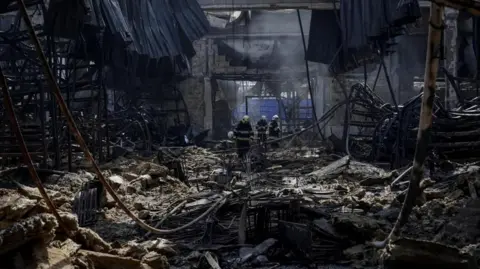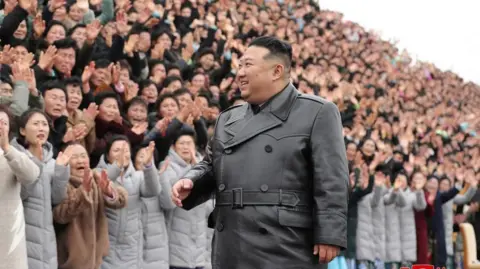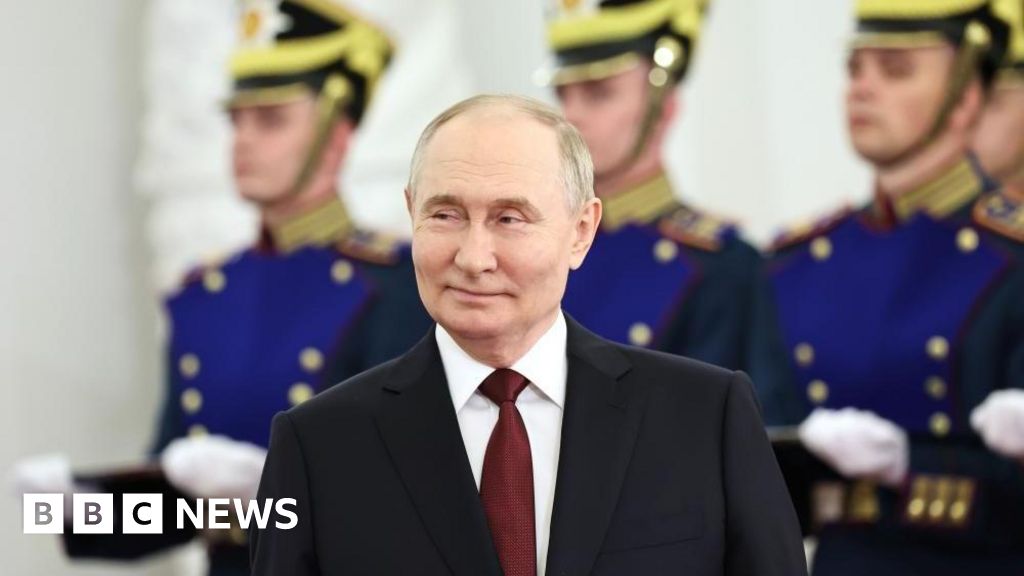By Ben Tavener, Moscow producer
 Reuters
ReutersFor months, Russia-watchers have known President Vladimir Putin would be heading to North Korea.
After Kim Jong Un’s big green bulletproof train trundled around Russia’s Far East last year, the North Korean leader invited Mr Putin to visit him. That invitation was duly accepted.
But this long-expected visit is now said to be just days away: South Korean sources suggest it could be as soon as Tuesday, and satellite images have also spied apparent preparations under way in North Korea.
One thing is for sure: it has journalists both in Russia and abroad clamouring for any hint of news.
The Kremlin insists those details will come in due course, but speculation is now at fever point.
But why does it matter and why now?
Firstly, there is a natural curiosity given it would only be Mr Putin’s second time in North Korea – the first being in 2000 at the start of his presidential career, when Mr Kim’s father, Kim Jong Il, was still supreme leader.
But beyond that, this is a relationship that (though not at the levels enjoyed during the Soviet Union) has now gone from mutual pleasantries to mutual benefits, and it has the West worried.
The Kremlin has said there is scope for “very deep relations” between Russia and North Korea, and although it said this shouldn’t concern anyone, it recommended those thinking of challenging the burgeoning ties to think again.
There has been a lot of speculation about what exactly the two sides want from one another. And it seems to boil down to security of supplies.
Russia is likely seeking ammunition, construction workers, even volunteers to go to the front line in Ukraine, says political scientist and Putin ally, Sergei Markov.
In reply, Pyongyang could get Russian produce, as well as technological help for military goals, including its long-range missile programme ultimately to be within striking distance of the US, Mr Markov adds.
 Reuters
ReutersThere is no doubt that Russia needs to feed its war in Ukraine.
A recent Bloomberg report, citing South Korea’s defence ministry, suggests North Korea has shipped nearly five million artillery shells to Russia.
Finding a partner that shares a keen disdain of sanctions and the West, and therefore one that wants to trade, is a major selling point for Russia.
After all, Russia and North Korea are the two most-sanctioned countries in the world – North Korea for developing nuclear weapons and launching a series of ballistic missile tests.
Earlier this year, Moscow dealt sanctions against Pyongyang a serious blow by vetoing a UN Security Council resolution to extend the panel overseeing them.
A friendly diplomatic move.
And there may even be a real friendship between the two leaders, albeit a cautious and business-like one. In February, Mr Putin gifted Mr Kim a luxury Russian limousine (in violation of UN sanctions).
Mr Kim said North Korea is an “invincible comrade-in-arms” with Russia in a recent message to President Putin.
But it could just be business and a lack of other options.
Put bluntly: North Korea is now of greater value to an isolated Russia – and North Korea sees Moscow needs friends.
 Reuters
ReutersBy visiting North Korea, Mr Putin can simply demonstrate to his detractors that he can – and will – do what he wants.
Find a workaround to the Western sanctions slapped on his country? For now, yes, he can.
Convince others to violate sanctions and sell Russia weapons? Apparently so.
Forge new relations with countries around the world despite waging his so-called “special military operation”? He’s definitely trying.
Ever since President Putin ordered troops into neighbouring Ukraine, he has pushed the idea that the West’s dominance is on the way out – and has courted those who agree with him or are at least open to that philosophy.
At a recent economic forum in St. Petersburg, it’s no accident one of Mr Putin’s key guests was the president of Zimbabwe – another country to have felt the keen sting of sanctions.
And Russia has been falling over itself to show that it has many friends around the world that sing from the same hymn sheet. From Asia, Latin America, Africa – anyone disenchanted with the ways of a US-led world is welcome.
Indeed, when Zimbabwean President Emmerson Mnangagwa took to the stage, President Putin’s buzzwords rocketed out of his speech, with a new “multipolar world” as opposed to an arrogant West bent on shoring up its “global hegemony” at any cost.
Mr Putin has also courted closer ties with Iran, another country pummelled by sanctions that is eager to sell its military wares – in Tehran’s case, drones. And if it rattles the West, all the better.
When President Putin finally boards his plane to Pyongyang, he knows the images will captivate the world and leave no doubt that he is willing to do both business and politics with the partners of his choosing.
And while China will have its own reservations about Russia’s rapprochement with North Korea, any red lines will have been drawn when presidents Putin and Xi met during the Russian leader’s first overseas trip of his fifth term in office – itself dripping with symbolism about Russia’s declared shift to the East.
Few countries do strongman ceremony as pompously as Russia – but North Korea can certainly give them a run for their money. And with Russia’s shift away from traditional democracy, the gap between the two countries’ leaderships looks to be shrinking.
It doesn’t necessarily follow, of course, that ordinary Russians welcome their country’s growing closeness with North Korea, given their cultural and historical ties with Europe and the West. And this is one potential risk that Mr Putin will have to live with – as well as any new steps taken by Western powers in the aftermath of the two strongmen meeting.
In the end, we very likely won’t find out what’s been agreed – we didn’t when Kim Jong Un came to Russia last year.
But with watertight optics and messaging, the stage will be set for a defiant Putin to stride out – in the world’s most isolated country – and declare: “Yes, I can – watch me.”


